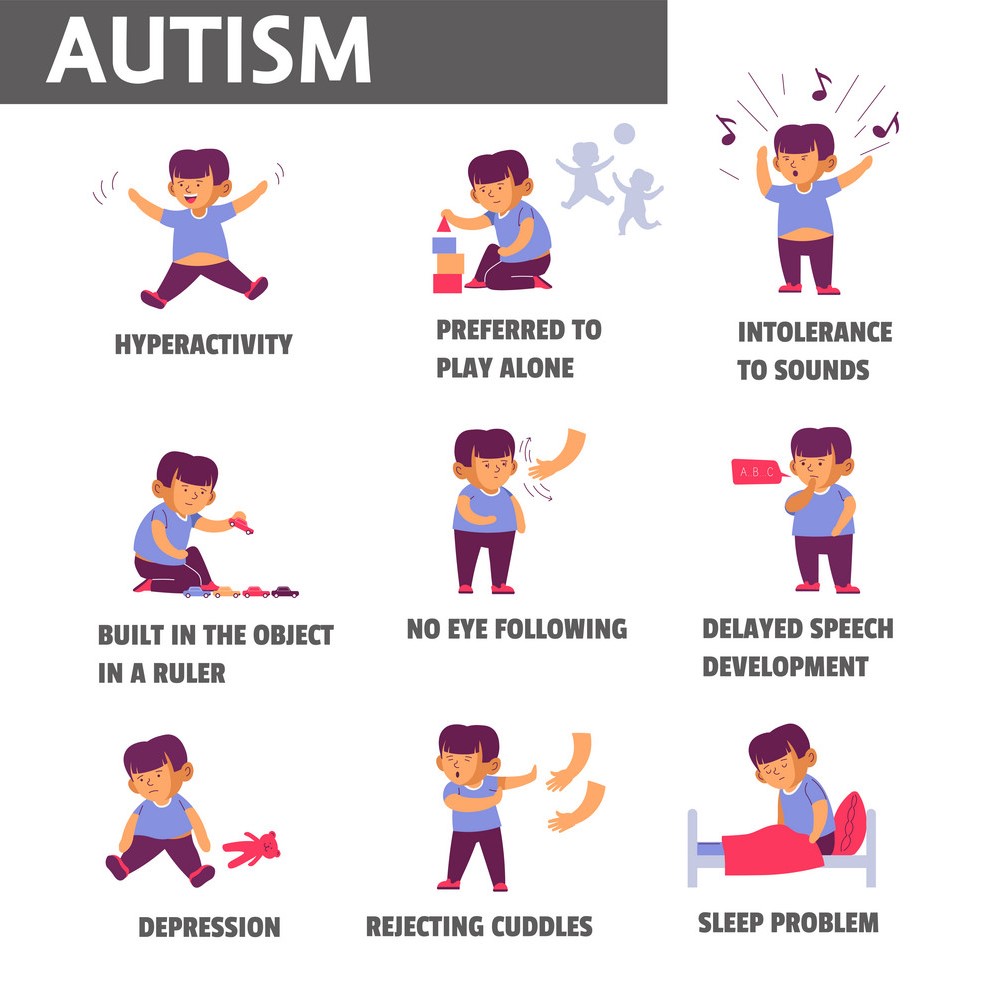Autism spectrum disorder (ASD) is a developmental disability that can cause significant social, communication and behavioral challenges. There is often nothing about how people with ASD look that sets them apart from other people, but people with ASD may communicate, interact, behave, and learn in ways that are different from most other people. The learning, thinking, and problem-solving abilities of people with ASD can range from gifted to severely challenged. Some people with ASD need a lot of help in their daily lives; others need less.
A diagnosis of ASD now includes several conditions that used to be diagnosed separately: autistic disorder, pervasive developmental disorder not otherwise specified (PDD-NOS), and Asperger syndrome. These conditions are now all called autism spectrum disorder.
Signs and Symptoms
People with ASD often have problems with social, emotional, and communication skills. They might repeat certain behaviors and might not want change in their daily activities. Many people with ASD also have different ways of learning, paying attention, or reacting to things. Signs of ASD begin during early childhood and typically last throughout a person’s life.
Children or adults with ASD might:
- not point at objects to show interest (for example, not point at an airplane flying over)
- not look at objects when another person points at them
- have trouble relating to others or not have an interest in other people at all
- avoid eye contact and want to be alone
- have trouble understanding other people’s feelings or talking about their own feelings
- prefer not to be held or cuddled, or might cuddle only when they want to
- appear to be unaware when people talk to them, but respond to other sounds
- be very interested in people, but not know how to talk, play, or relate to them
- repeat or echo words or phrases said to them, or repeat words or phrases in place of normal language
- have trouble expressing their needs using typical words or motions
- not play “pretend” games (for example, not pretend to “feed” a doll)
- repeat actions over and over again
- have trouble adapting when a routine changes
- have unusual reactions to the way things smell, taste, look, feel, or sound
- lose skills they once had (for example, stop saying words they were using)

Diagnosis
Diagnosing ASD can be difficult since there is no medical test, like a blood test, to diagnose the disorders. Doctors look at the child’s behavior and development to make a diagnosis.
ASD can sometimes be detected at 18 months or younger. By age 2, a diagnosis by an experienced professional can be considered very reliable.1 However, many children do not receive a final diagnosis until much older. This delay means that children with ASD might not get the early help they need.
Treatment
There is currently no cure for ASD. However, research shows that early intervention treatment services can improve a child’s development. Early intervention services help children from birth to 3 years old (36 months) learn important skills. Services can include therapy to help the child talk, walk, and interact with others. Therefore, it is important to talk to your child’s doctor as soon as possible if you think your child has ASD or other developmental problem.
In addition, treatment for particular symptoms, such as speech therapy for language delays, often does not need to wait for a formal ASD diagnosis.
Causes and Risk Factors
We do not know all of the causes of ASD. However, we have learned that there are likely many causes for multiple types of ASD. There may be many different factors that make a child more likely to have an ASD, including environmental, biologic and genetic factors.
- Most scientists agree that genes are one of the risk factors that can make a person more likely to develop ASD.
- Children who have a sibling with ASD are at a higher risk of also having ASD.
- Individuals with certain genetic or chromosomal conditions, such as fragile X syndrome or tuberous sclerosis, can have a greater chance of having ASD.
- When taken during pregnancy, the prescription drugs valproic acid and thalidomide have been linked with a higher risk of ASD.
- There is some evidence that the critical period for developing ASD occurs before, during, and immediately after birth.
- Children born to older parents are at greater risk for having ASD.
What causes autism in children?
While there is no one definitive cause, scientists agree that genetics can be a factor in some cases. A child who has a sibling with autism has a higher risk. Also, a child born prematurely, having a low weight at birth, or having been exposed to lead can have a higher chance of developmental issues, and it is thought they should be screened for ASD. Read more on Autism Parenting Magazine .

Who is Affected
ASD occurs in all racial, ethnic, and socioeconomic groups, but is about 4 times more common among boys than among girls.
If You’re Concerned
If you think your child might have ASD or you think there could be a problem with the way your child plays, learns, speaks, or acts, contact your child’s doctor, and share your concerns.
If you or the doctor is still concerned, ask the doctor for a referral to a specialist who can do a more in-depth evaluation of your child. Specialists who can do a more in-depth evaluation and make a diagnosis include:
- Developmental Pediatricians (doctors who have special training in child development and children with special needs)
- Child Neurologists (doctors who work on the brain, spine, and nerves)
- Child Psychologists or Psychiatrists (doctors who know about the human mind)
Vaccine Safety
Some people have had concerns that ASD might be linked to the vaccines children receive, but studies have shown that there is no link between receiving vaccines and developing ASD. For more information about vaccines and ASD
Prepared : Negin Ghafouri – Biomedical Engineering Student
Source : www.cdc.gov



